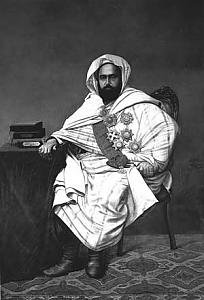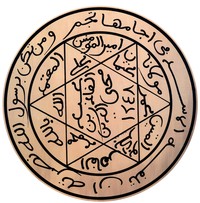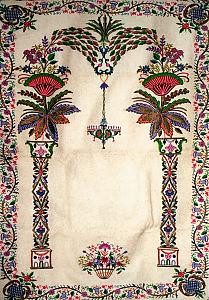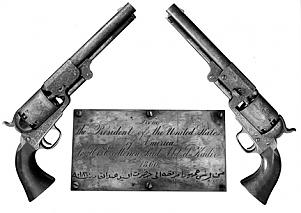The Abd El-Kader ProjectStarting in Iowa, the project (www.abdelkaderproject.org) is growing a worldwide movement to revive the legacy of Emir Abdelkader. Our goal is to restore the historical memory of a remarkable human being whose importance today is greater than ever. He was also an Arab warrior-scholar-statesman respected and admired from the Missouri Territory to Moscow to Mecca. When he died in 1883, the New York Times wrote, he “deserved to be counted among the few great men of the century.” The project was born from Commander of the Faithful: The Life and Times of Emir Abdelkader, a Story of True Jihad (Monkfish Books) launched in Elkader, Iowa in 2008. The emir’s fame was such that in 1846 a country lawyer in Dubuque named a settlement after the “valiant Arab chieftain” who had been frustrating a French colonial occupation of North Africa for 15 years. Exiled in Damascus, he reached the pinnacle of his fame by saving the lives of thousands of local Christians and the European diplomatic community who were the object of a local pogrom in 1860. Using the life of the emir as a seed, the project wants to attract other stories of Muslims whose example can inspire Muslims and non Muslims alike. There is a need to build a counter narrative to balance the almost exclusively negative images of Muslims presented through the media. To think straight, people need more than lopsided, sensational information about Islam. That seems to be the reason Monks of Tibhirine and Commander of the Faithful have resonated widely among both Muslims and non Muslims.
Why Revive His Memory?To serve as a Role Model for Muslims. As a pious and deeply conservative Muslim, his life of “true jihad” can inspire Muslims in the US and around the world to think differently about the meaning of jihad. To serve as a Role Model for non-Muslims. His exemplary life of moral courage, compassion, self-restraint, intellectual accomplishment (or, bandwidth, as Bill Gates would say) and chivalry in war can inspire all people, regardless of nationality or religion. Abdelkader’s life provides an alternative narrative of Islamic ethics in war and peace to be held up against the growing Western phobia toward Islam and the distortions of Islam by so-called Muslims. He represents the little-heard good news about Islam.
Particular Qualities that Make Abdelkader a Universally Relevant Figure TodayAbdelkader exemplifies the kind of Muslim the US should be engaging with today—conservative, committed to his faith, not perceived as “Westernized,” respected for his religious authority, intellect and courage. He was a unifier not a divider. For Abdelkader, no religion owns ultimate Truth. Nor can the finite grasp the infinite. There is no conflict in his mind between politics, religion and knowledge. They should all work to serve the end of glorifying God. Politics should aim to lead people to live in harmony with one another. Religion provides a common moral base of shared values and recognition of a common origin. Knowledge will ultimately lead us to grasp the basic unity of mankind. Abdelkader was “local” yet “universal” at the same time. He was deeply and authentically Muslim, yet his religion was not a safety belt holding his identity together; rather a platform for probing the meaning of God’s creation.
The emir’s fame stretches from the 19th century to todayThe emir's regulations for the treatment of his prisoners were a Koranically-correct forerunner of the Geneva Convention, celebrated by the United Nations at the Palais des Nations November 4, 2010. Citizens of Bordeaux put Abd el-Kader’s name on the ballot as a candidate in the French presidential elections of 1849. A horse named Abd el Kader ('Little Ab' by the racing public) was twice winner of the British Grand National Steeple Chase. The emir's most influential biographer was a descendent of the Duke of Marlborough, Col. Charles Henry Churchill, British military attaché in Lebanon. The Suez Canal would not have been built in 1869 without Abd el-Kader's influence among the Arabs, and support for the French project. President Lincoln honored Abd el-Kader as a great humanitarian for saving thousands of Christian lives in 1860.
Quotes from the EmirThose who belong to the religion of Mohammed have corrupted it, which is why they are like lost sheep… (letter to bishop Pavy, 1860) All the religions of the Book rest on two principals—to praise God and have compassion toward his creatures… (letter to bishop Pavy, 1860) All creatures are part of God’s family, and those most loved by God are those who do the most good for His family (letter to bishop Pavy, 1860) “Abdelkader speaks like a theologian at the Sorbonne and is in perfect communion with the Pope when he says, ‘Faith is above reason, but as they both come from God, there can be no conflict between them, only mutual support.’” Gustave Dugat 1858 introduction to French Academy of Sciences The prophets are like men who have a common father, but each has a different mother… Letter to the French 1855 Our God and the God of all the communities different from ours are in reality all one God… He reveals himself to Muslims as beyond all form, to Christians in the person of Jesus Christ and monks… emir’s Letter to the French 1855 |





